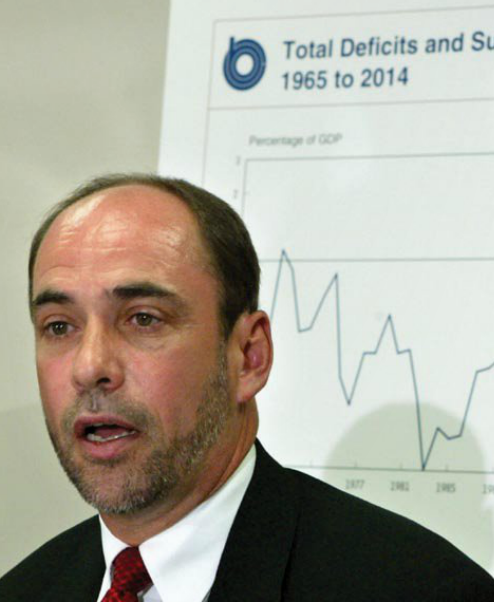Budget deficits matter. They may be irrelevant politically; they may move financial markets only intermittently, but they always impact the economy. This is unsurprising.
Budget deficits are the difference between federal spending and federal taxes. Federal spending matters – reflect only for a second on pork barrel spending and other waste, the work incentives of anti-poverty programs, or other spending impacts.
Federal taxes matter – the income and payroll taxes embody disincentives for work, saving, investment and risk-taking. Deficits have to matter. If they didn’t, then there should be no debate over the economic consequences of anything the federal government does.
Economic Effects of Budget Deficits
The main impact of a budget deficit is to lower national saving. That is, deficits shift the composition of U.S. economic activity away from saving for the future and toward consuming. Why? The vast majority of federal spending is designed to increase current consumption. Retirement income programs (Social Security), retirement health programs (Medicare), anti-poverty programs (Medicaid, food stamps, TANF) and so forth are explicitly intended to raise the living standards of households; that is, allow them to spend more. Taxes, in contrast, do not work exclusively to offset this bias toward consumption – they reduce some consumption, but some saving as well. The net effect (even when the budget is balanced) is to lower saving.
Economic growth involves sacrificing current satisfaction and using the saving to finance innovation, new equipment and facilities, and greater job skills. Reducing national saving inhibits this process and lowers the potential for the U.S. economy to produce growth in living standards.
Structural deficits – “deficits as far as the eye can see” – are the poster child for lower national saving.
Structural deficits – “deficits as far as the eye can see” – are the poster child for lower national saving. At present, the federal government spends 20 cents out of every national dollar and raises 18 cents in taxes. This is postwar business as usual for the U.S.
However, the United States is staring the impending retirement of the baby boom generation square in the face. As a result, over the next four decades spending on Social Security is projected to rise from 4½ cents to nearly 7 cents out of every national dollar.
Over the same period, federal spending on Medicare and Medicaid will rise from 4 cents to anywhere from 12 cents to 22 cents. The result is three programs that equal or exceed the entire current federal budget depending on the pace of growth in health care costs.
Left unchanged, the resulting rise in deficit spending will eat away at national saving and have a corrosive impact on growth in future living standards.
Why not just raise taxes? After all, arithmetic indicates that higher taxes will make deficits disappear. But higher taxes will further reduce saving; they do not just come out of household consumption. And raising taxes to the levels implied by spending growth, perhaps twice as much as at present, would have a crippling impact on economic incentives. The focus must be on reducing growth in spending.
Caveats
Public understanding of deficits is complicated by the fact that less saving is a virtue on occasion. In the depths of a recession businesses are desperate to find someone willing to buy their products. Deficits provide this impetus and speed the recovery toward full utilization of capital and labor. This explains why the swing from a federal surplus of 2.4 percent of Gross Domestic Product (GDP) in 2000 to a deficit of 3.6 percent of GDP – a full 6 percent of GDP – served to cushion the recession and have little harmful impacts.

When saving falls, the entrepreneurs home builders, and businesses compete to have access to a smaller pool of dollars, and [interest] rates rise.
But now that the economy is chugging along there is no further virtue to too much spending. Business cycles throw another wrench into public understanding of deficits. They make them worse. As the economy slumps, taxes fall and spending on programs like unemployment insurance and food stamps rises. The rise in deficits is transitory and not the result of proactive policy decisions. A better picture of the long-run impact of policies emerges when the economy recovers. The deficits that remain are what really will matter.
Financial Market Effects of Budget Deficits
It is sometimes argued that the problem with deficits is that they cause higher interest rates. That may be true, but this is just a potential symptom of lower national saving. When saving falls, the entrepreneurs, home builders, and businesses compete to have access to a smaller pool of dollars, and rates rise. In the process, projects get cancelled, expansions get scaled back, and new products get deferred. The result is diminished growth; higher interest rates are just the mechanism.
However, it may also be the case that interest rates do not rise in response to federal budget deficits. In particular, international capital flows may offset the lower national saving and keep interest rates low. More generally, this argument applies to a broader array of financial indicators. Deficits may or may not be accompanied by higher interest rates, lower stock prices, and shifts in the value of the dollar. But they are associated with reduced saving as a nation. Since the United States is the premier location for investment capital it is possible that households in Shanghai or Seoul will supply savings that the United States does not. Unfortunately, these same households have a claim to the return on these investments. Their gain is our loss.
In sum, deficits matter, and they matter because they lower national saving; slow the accumulation of capital, labor, and technology; and reduce the growth of living standards. The fiscal 2006 deficit of 2 percent of GDP is typical for the United States and does not raise alarms. However, the potential for future federal budget deficit spending is alarming.
Douglas Holtz-Eakin is the Paul A. Volker Chair in International Economics and Director of the Maurice R. Greenberg Center for Geoeconomic Studies at the Council of Foreign Relations. From 2003 to 2005, he served as Director of the Congressional Budget Office.




